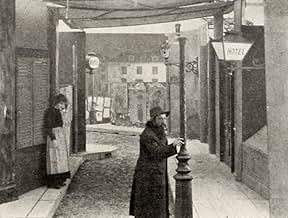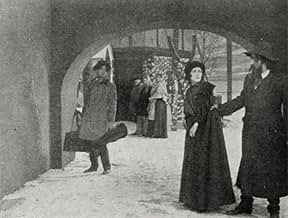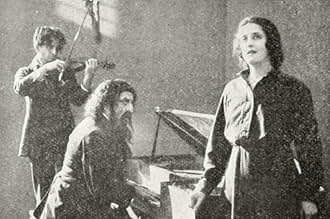Aggiungi una trama nella tua linguaA hypnotic Svengali controls the singing voice of a young starlet, but he cannot control her heart.A hypnotic Svengali controls the singing voice of a young starlet, but he cannot control her heart.A hypnotic Svengali controls the singing voice of a young starlet, but he cannot control her heart.
Trama
Lo sapevi?
- ConnessioniVersion of Trilby and Little Billee (1896)
Recensione in evidenza
There is an excellent print of this silent film in the Cineteca del Friuli, Gemona.
'Trilby' was originally a novel by artist George du Maurier: remarkably, he wrote and illustrated this book after going blind in one eye and losing most of the sight in his other eye. A successful stage version was performed in London, in which the actress playing the title role made her first entrance wearing a man's snap-brim hat: this created such a sensation that hats of this type have ever afterward been known in Britain as trilbies.
This film version is too short to dramatise the entire novel, but it abridges the plot effectively. In the original novel, a young Englishman named Little Billee (why did du Maurier use this annoying spelling?) is an aspiring artist in Paris, who shares his studio space with two other Britons: a Welshman nicknamed Taffy and a Scotsman cried the Laird. They are faithful companions, who deem themselves 'the Three Musketeers of the brush'. In this film, Billy's two companions are reduced to end-men with no distinctive business of their own. (Taffy is played by James Young, husband of this film's star.)
In the title role, Clara Kimball Young is attractive, and she impressively depicts the two distinct personalities of Trilby: her true self, and her alter ego under the mesmeric spell of Svengali. There's a powerful symbolic scene -- visually impressive -- in which Trilby, in diaphanous robes of virginal white, struggles in the mesh of Svengali's sinister plans.
Svengali is well-played here by Wilton Lackaye, a distinguished American stage actor who made only a few films and no talkies. Lackaye's private life was much like that of John Barrymore, with many anecdotes about his drunken carousing. It's interesting that Barrymore later played Svengali in an early talkie version of this story. As Svengali, Lackaye overacts in a role that almost demands to be overplayed.
Amusingly, in this silent film, we learn that Svengali's forename is Belznick! Apparently this was meant as an in-joke reference to producer Myron Selznick. An actor named Paul McAllister, previously unknown to me, is quite good as Gecko, Svengali's minion violinist. I'll rate this film 8 out of 10, but I recommend that you put off watching it until you're familiar with the plot, either from the original novel or from another film version: the abridged version here will confuse anyone who doesn't already know the story.
'Trilby' was originally a novel by artist George du Maurier: remarkably, he wrote and illustrated this book after going blind in one eye and losing most of the sight in his other eye. A successful stage version was performed in London, in which the actress playing the title role made her first entrance wearing a man's snap-brim hat: this created such a sensation that hats of this type have ever afterward been known in Britain as trilbies.
This film version is too short to dramatise the entire novel, but it abridges the plot effectively. In the original novel, a young Englishman named Little Billee (why did du Maurier use this annoying spelling?) is an aspiring artist in Paris, who shares his studio space with two other Britons: a Welshman nicknamed Taffy and a Scotsman cried the Laird. They are faithful companions, who deem themselves 'the Three Musketeers of the brush'. In this film, Billy's two companions are reduced to end-men with no distinctive business of their own. (Taffy is played by James Young, husband of this film's star.)
In the title role, Clara Kimball Young is attractive, and she impressively depicts the two distinct personalities of Trilby: her true self, and her alter ego under the mesmeric spell of Svengali. There's a powerful symbolic scene -- visually impressive -- in which Trilby, in diaphanous robes of virginal white, struggles in the mesh of Svengali's sinister plans.
Svengali is well-played here by Wilton Lackaye, a distinguished American stage actor who made only a few films and no talkies. Lackaye's private life was much like that of John Barrymore, with many anecdotes about his drunken carousing. It's interesting that Barrymore later played Svengali in an early talkie version of this story. As Svengali, Lackaye overacts in a role that almost demands to be overplayed.
Amusingly, in this silent film, we learn that Svengali's forename is Belznick! Apparently this was meant as an in-joke reference to producer Myron Selznick. An actor named Paul McAllister, previously unknown to me, is quite good as Gecko, Svengali's minion violinist. I'll rate this film 8 out of 10, but I recommend that you put off watching it until you're familiar with the plot, either from the original novel or from another film version: the abridged version here will confuse anyone who doesn't already know the story.
- F Gwynplaine MacIntyre
- 31 ago 2005
- Permalink
I più visti
Accedi per valutare e creare un elenco di titoli salvati per ottenere consigli personalizzati
Dettagli
- Tempo di esecuzione59 minuti
- Colore
- Mix di suoni
- Proporzioni
- 1.33 : 1
Contribuisci a questa pagina
Suggerisci una modifica o aggiungi i contenuti mancanti




















